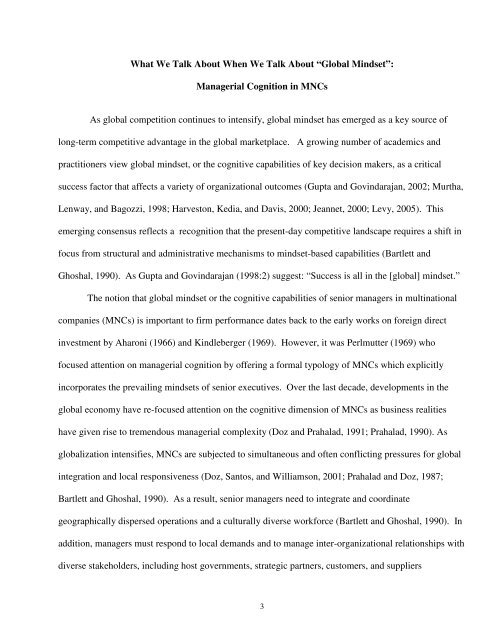What We Talk About When We Talk About “Global Mindset”
What We Talk About When We Talk About “Global Mindset”
What We Talk About When We Talk About “Global Mindset”
Create successful ePaper yourself
Turn your PDF publications into a flip-book with our unique Google optimized e-Paper software.
<strong>What</strong> <strong>We</strong> <strong>Talk</strong> <strong>About</strong> <strong>When</strong> <strong>We</strong> <strong>Talk</strong> <strong>About</strong> <strong>“Global</strong> <strong>Mindset”</strong>:<br />
Managerial Cognition in MNCs<br />
As global competition continues to intensify, global mindset has emerged as a key source of<br />
long-term competitive advantage in the global marketplace. A growing number of academics and<br />
practitioners view global mindset, or the cognitive capabilities of key decision makers, as a critical<br />
success factor that affects a variety of organizational outcomes (Gupta and Govindarajan, 2002; Murtha,<br />
Lenway, and Bagozzi, 1998; Harveston, Kedia, and Davis, 2000; Jeannet, 2000; Levy, 2005). This<br />
emerging consensus reflects a recognition that the present-day competitive landscape requires a shift in<br />
focus from structural and administrative mechanisms to mindset-based capabilities (Bartlett and<br />
Ghoshal, 1990). As Gupta and Govindarajan (1998:2) suggest: “Success is all in the [global] mindset.”<br />
The notion that global mindset or the cognitive capabilities of senior managers in multinational<br />
companies (MNCs) is important to firm performance dates back to the early works on foreign direct<br />
investment by Aharoni (1966) and Kindleberger (1969). However, it was Perlmutter (1969) who<br />
focused attention on managerial cognition by offering a formal typology of MNCs which explicitly<br />
incorporates the prevailing mindsets of senior executives. Over the last decade, developments in the<br />
global economy have re-focused attention on the cognitive dimension of MNCs as business realities<br />
have given rise to tremendous managerial complexity (Doz and Prahalad, 1991; Prahalad, 1990). As<br />
globalization intensifies, MNCs are subjected to simultaneous and often conflicting pressures for global<br />
integration and local responsiveness (Doz, Santos, and Williamson, 2001; Prahalad and Doz, 1987;<br />
Bartlett and Ghoshal, 1990). As a result, senior managers need to integrate and coordinate<br />
geographically dispersed operations and a culturally diverse workforce (Bartlett and Ghoshal, 1990). In<br />
addition, managers must respond to local demands and to manage inter-organizational relationships with<br />
diverse stakeholders, including host governments, strategic partners, customers, and suppliers<br />
3









